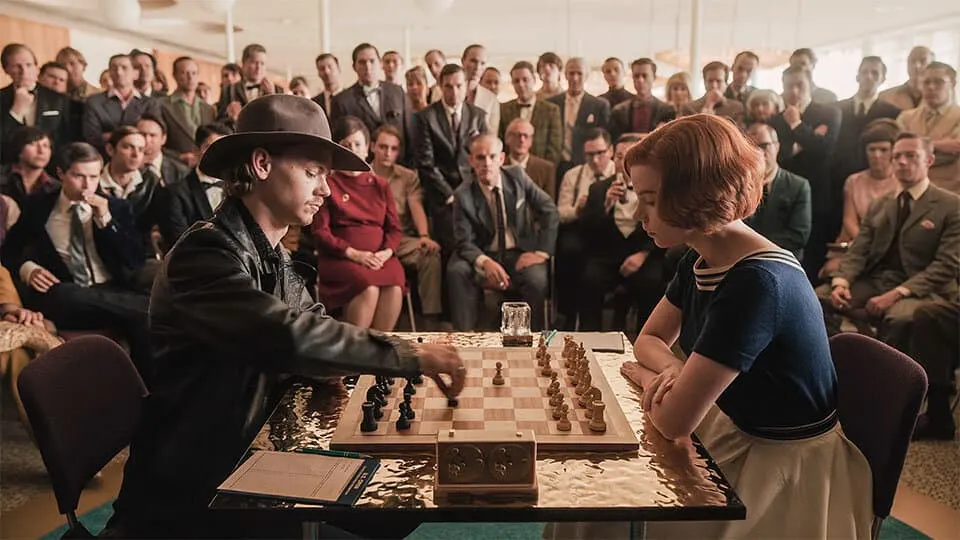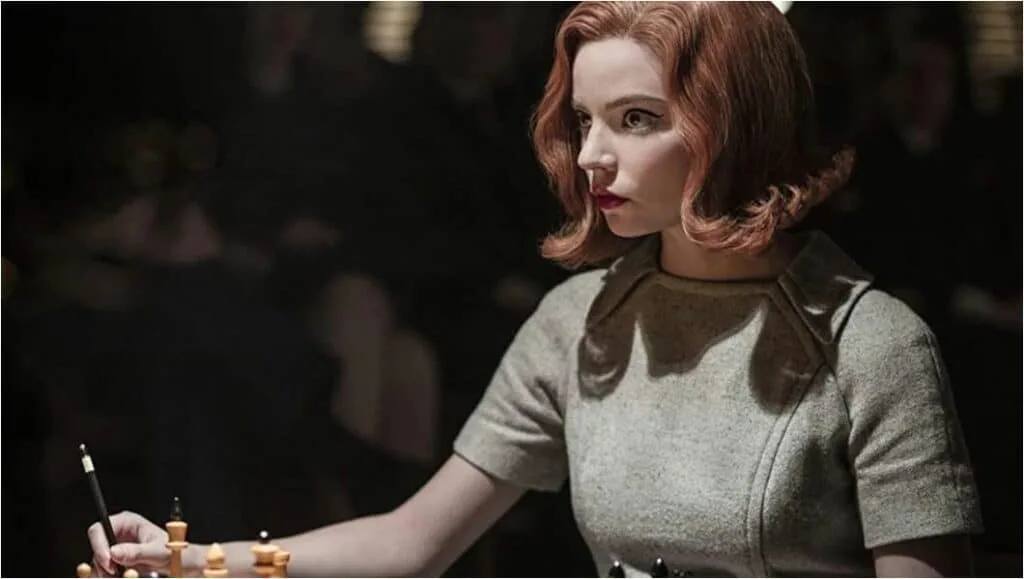- Beyond the Aquila Rift Explained: What The Ending Really Means - April 4, 2022
- Best Movies Like Paper Towns: Our Top Recommendations - April 4, 2022
- Best Movies Like Moana: Must-See for Disney Fans - March 4, 2022
Netflix releases with such carelessness some of its series that, when these turn out to be more than correct products, it almost makes you angry to see how the suspicious algorithm of the platform suddenly endorses it. This has happened with The Queen’s Gambit, the miniseries based on Walter Tevis’ novel, which arrived in the catalog last October without much hype and is now among the illustrious top 10 of the catalog. Let’s have a closer look at the show and don’t miss out on our recommendations!
If you ask me, I don’t really know how to play chess. Well, yes and no. I mean, I know the rules and I know how to play but designing a strategy eludes me. And with The Queen’s Gambit, a superb period miniseries from Netflix, I admit that it makes me want to learn more.
It consists of seven episodes. Scott Frank, who we could see in Godless and as co-writer of Logan, writes and directs this adaptation of the beloved novel by Walter Tevis. Tevis was an old acquaintance in Hollywood, as much of his novelistic work has been adapted (The Hustler, The Color of Money, and The Man Who Fell to Earth).
Shows like Queen’s Gambit – Placing the Pieces
The Beginning of a Brilliant Mind
https://www.youtube.com/watch?v=CDrieqwSdgI
The miniseries tells the life of Beth Harmon, played by Anya Taylor-Joy (The Witch, The Miniaturist), an orphan who from a very young age has a special talent for chess. Eventually, Beth learns to secretly play the game and begins to stand out as a prominent figure in a world dominated by men.
Apart from her playful side, the miniseries also deals with the protagonist’s addiction to tranquilizers, since she was administered them -and she “dosed” herself- in the orphanage where she lived. Besides this, she will also develop emotional and alcohol problems.
Dabbling with Gender
Scott Frank’s Three Touchstones

As a screenwriter, Scott Frank works three touchstones to tell the story of the entire show. The first is setting it up as if it were a fictional biopic on a formal level. It goes beyond the drama starring a hero – the heroine in this case – vs. the world and flirts with a tremendously fashionable genre currently seeking, at all times, authenticity in what is being told.
It also helps this perception that the camera barely moves away from Beth. It’s her life and what happens outside of it will only matter to us at the moment when she has to face it. This gives it an extra aura that makes, without being based on the life of any specific character – Tevis himself got to play at some level when he was young – the story is intimate, human, and truthful.
This, so to speak, tunnel vision is also a reflection of the personality and the way of seeing chess, and by extension life, on the part of the protagonist. She immerses herself in the game as if it were her own microcosm in which she is the master and mistress. Her instincts are unleashed in the face of the little emotional education (or attention) she has experienced.
A Delicate Chess Journey
It’s More than Just a Game

In The Queen’s Gambit, we enter a delicate journey of maturity of someone to whom the system has failed since she was a child and has led to her addictions, to alcohol, to the so-called green pills while she suffers from a lack of affection.
This brings us to Frank’s last touchstone: we are facing a gigantic flashback. Thus, after the small introductory prologue, we go back to the childhood of this young Beth from her years in the orphanage (Isla Johnston in its nine-year-old version). No jumping past and present: in strictly chronological order we get to know the lights, shadows, and evolution of this chess player.
All this could fall into water under the bridge were it not for Anya Taylor-Joy’s performance, so rich in nuances within a restraint that manages to be fascinating. As a director, Scott Frank enhances her already mesmerizing presence in a drama that is well-crafted from top to bottom.
In short, The Queen’s Gambit is a passionate look at chess, the loneliness of the player, and, ultimately, the struggle against the personal demons that haunt us.
Anya Taylor-Joy & Beth Harmon
The Secret Behind its Success
Anya Taylor-Joy proves herself capable of keeping pace with these stylistic mutations with a restrained performance. She prudently peeks out from the stucco of what might appear to be a rigid character. In the construction of the orphan, overwhelmed by the loneliness of the corridor in the background and the obsession to restore the emptiness of her childhood, the actress draws a blunt outline that mingles with delicate tics. The viewer knows of the girl’s irrational asperity, for example, because when she enters stores or establishments she grunts, instead of greeting, as one would expect no less from someone raised like a broody hen.

The diaphanousness of the context, condensed in those dysfunctional families in which Beth grows up and which lean doubly to one side of the bed (her biological and adoptive mothers), contrasts with what really happens to the young girl, a somewhat more elusive layer of meaning. Upon arrival at the orphanage, the girl is stripped of her own history. Her hair is cut off, she is given a uniform, and the clothes she brought from her previous life are burned, emptying her of the past and making her homogeneous. Thus, the first half of the miniseries is devoted to showing how those cracks are being filled with other substances: chess and the yearning, not to master the game, but to become different, unique again. A complete individual.
The hand of the director and screenwriter, who is a complete author, visibly accompanies this transition, which becomes more violent as the mimesis goes by. Frank jumps from the oranges that dominate the hospice landscape to the greens of the residential suburb where the first visceral ties of adolescence flourish, always set against the ultra-rationalism of chess, which is but one of the multiple possible incarnations of Beth’s painful need to find a system of coordinates of her own. The board and pieces are actually a borrowed worldview that allows her to organize the world. Anya Taylor-Joy could play a fabulous jockey, rather than a chess player, and the brutal loneliness of her character would remain unchanged.
The bad thing about The Queen’s Gambit is the inevitability of a miniseries, and that is, it’s short. And even if you feel like picking up a chessboard, you perhaps may also fancy watching a series that bears some resemblance to this one. That’s exactly why there’s a small list down below, with shows that are a perfect match for The Queen’s Gambit. It’s your move!
Unorthodox
Calling for Freedom
Esther Shapiro (Shira Haas) is a girl from the New York neighborhood of Williamsburg who belongs to the ultra-Orthodox community of Satmar, and who flees to Berlin in search of a different life and freedom. Unorthodox starts with that premise, an adaptation of Deborah Feldman‘s autobiographical novel and Netflix’s proposal in which Yiddish, German and English are spoken.
Its start is unbeatable; good performances and the explicit reproduction of a sectarian community in which women are mere tools to bring children into the world. Without the need for explicit violence, it manages to convey the feeling of suffocation that Esther suffers and the claustrophobia that many women must feel in a society monopolized by the trauma of the past and the will to increase its population.
It is possible that for men, too, it is a hopeless situation. But Esther’s escape is not only reasonable, it is presented as the only alternative for those who do not want to follow 100% a tradition without adaptability or hope for them. And she does it with nothing more than four papers, some money, and the contact of a mother who abandoned her a long time ago.
The Marvelous Mrs. Maisel
Standing Up Against Stereotypes
It is 1958, Midge (Rachel Brosnahan) is a Jewish housewife who lives a perfect life. She has a charming husband, Joel (Michael Zegen), who is a businessman, they have two children and live a comfortable life in New York. They both have a flair for comedy and frequent the “open mic” at the Gaslight, where he does his numbers. After a “bad night,” Joel confesses to having an affair and leaves her.
Heartbroken, Midge goes to her family for support but finds only disapproval. Seeking solace in alcohol, she appears on stage at the Gaslight to unburden herself in a comic monologue about her own personal tragedy, which will lead Midge to discover her innate talent for comedy and how her tongue and attitude get her into more than a little trouble.
If you like period series, particularly those set, like The Queen’s Gambit, set in the 1960s in the United States, then you will definitely be interested in The Marvelous Mrs. Maisel. And we doubt you don’t know it, because it is one of Amazon Prime Video’s most acclaimed and award-winning productions.
Mrs. America
America’s Anti-Heroine
Another period and feminist series that has succeeded in 2020 (and available on HBO). Set in the United States in the 1970s, Mrs. America consists of a mosaic of characters related to the struggle of the second wave of feminism, through characters such as Gloria Steinem (Rosa Byrne) or Betty Friedan (Tracey Ullman). Cate Blanchett is Phyllis Schlafly, a conservative political leader who tried to thwart this cause.
Cate Blanchett is the headliner of ‘Mrs. America’, the leading opponent of the ratification of the Equal Rights Amendment (ERA) and a leading lady of the conservative American establishment. Smart and knows what she’s talking about.
In this sense, whether or not she resembles Schlafly’s actual personality, Blanchett is having a blast in her performance. She is a villain (or, at least, the anti-heroine) with a very clear position, who will not let up in her efforts to defeat the feminist movement, its contradictions, its charms, and its ways in order to get the cover.
Gentleman Jack
The Life of a LGBTQ+ Trailblazer
In 2011, Anne Lister’s diaries received recognition from the United Nations for their importance towards British history. Her story is interesting and exciting, that of a woman who in the early 19th century learned about human anatomy, was a landowner, a businesswoman, a traveler, and a lesbian. Lister defied one by one all the conventions established for those of her gender at the time and kept in her diaries a detailed record of her travels, her business, her family life, and, written in code, everything about her love life.
We enter the story in 1832 when the protagonist returns to the family home in Halifax after one of her long trips to take care of business. As she plans to revitalize the lands and reclaims her place in that world of decision-making lords unwilling to bend, Lister takes a personal interest in Ann Walker.
Gentleman Jack is the name by which the villagers referred to Anne Lister, to mock her attitudes that, by social construct, were considered masculine. The series focuses on her, impeccably played by Suranne Jones, who conveys Lister’s charisma and distinctive personality, with a magnetic presence, full of nuances and complexity, which she accompanies with a characteristic way of speaking, walking, and moving.
FAQs
Answer: A gambit is the surrender of a pawn in the opening (first moves in chess) to gain an advantage in the development and/or open lines and/or a weakening in the opponent’s position.
Answer: The Queen’s Gambit is a chess opening. It is characterized by moves (in algebraic notation). However, strictly speaking, it is not a gambit as such, since White can easily regain numerical equality of pieces, should Black capture it.
Answer: Beth Harmon is an eight-year-old orphan. She’s quiet, somber, and a seemingly insignificant child. Her predicament changes when she plays her first game of chess.
Answer: The green pills that Beth takes in The Queen’s Gambit are called benzodiazepines. They are psychotropic drugs widely used to treat anxiety, insomnia, depression, and other mental disorders.
Shows like Queen’s Gambit – Summary
Although we are facing a mini-revolution of captivating miniseries, it’s a shame to see the end of one that has such an impact as The Queen’s Gambit. No one expected the impact that the series starring Anya Taylor-Joy was going to have, and that’s why it was hard not being able to watch it anymore after just one season.
Yet, in a way, this also has its advantages, since The Queen’s Gambit opened the doors to series such as Unorthodox, The Marvelous Mrs. Maisel, Mrs. America, or Gentleman Jack, which were waiting to be seen. These four shows take the feminine essence of Beth Hardon and transform it into stories that will leave you breathless.
In a perfect world, it should be possible to watch them all in one day, but since we have more things to do during the day, it’s best to start one and then devour all the others! After watching The Queen’s Gambit, perhaps the best of the four shows is The Marvelous Mrs. Maisel, both to stay in the 60’s mood and to enjoy another charming female lead character. For something short and intense, the best is Unorthodox. For a bit of political and social drama, the show Mrs. America, starring Cate Blanchett, is definitely a forbidden pleasure. And finally, put on Gentleman Jack to make you shiver with emotions. Read Here:
